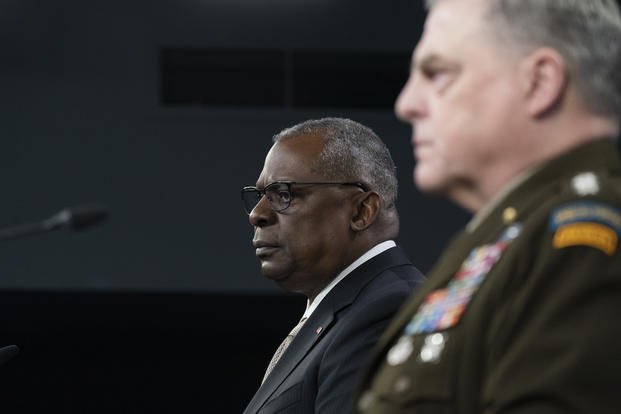A group of 47 nations met Monday and pledged new weapons shipments, including anti-ship missiles, as part of an intensifying effort to arm Ukraine in its nearly three-month-old war with Russia, Defense Secretary Lloyd Austin said.
The Harpoon missiles from Denmark -- along with attack helicopters, tanks and rocket systems from the Czech Republic -- were among aid announced by 20 nations, Austin said during a Pentagon press briefing. The missiles come as Russian warships are blocking grain exports from Ukraine's Odesa and other ports and threatening a global food crisis.
The virtual meeting was the second since April for the U.S. and dozens of countries that are alarmed by Russian President Vladimir Putin's invasion and eager to coordinate on sending aid to help swing the war in Ukraine's favor. The U.S., by far the largest contributor of aid, did not announce any new types of weapons shipments but has sent $3.9 billion worth of aid since the beginning of the conflict Feb. 24.
Read Next: Russian Sentenced to Life in Ukraine's 1st War Crimes Trial
"After today's discussions, I'm pleased to report that we're intensifying our efforts and, moving forward, we'll continue to deepen our coordination and cooperation so that Ukraine can sustain and strengthen its battlefield operations," Austin said. "Our combined efforts will also fortify and modernize Ukraine's armed forces, to help them deter future Russian aggression."
The Russian invasion of farmlands and its fleet in the Black Sea have halted shipments of grain and other food staples from Ukraine, which is known as the "breadbasket of Europe" but also exports food globally. In recent weeks, the war has caused higher prices on shelves around the world and sparked increasing warnings that the blockade could leave vulnerable people in many countries hungry.
Ukraine has been seeking anti-ship missiles from other countries, and the shipment from Denmark could potentially help its forces break the naval blockade.
The group that met Monday included many European nations such as Germany, France and the U.K., which has played a key role in supplying Ukraine and coordinating the assistance. But there were also countries from elsewhere in the world such as Japan, South Korea and Australia.
Poland, Italy, Greece and Norway also agreed to send artillery systems and ammunition, as those weapons have become critical in Ukraine's fight with Russia in the flat, open eastern region of the Donbas.
"Everyone here understands the stakes of this war, and they stretch far beyond Europe," Austin said.
Last week, the Pentagon announced another $100 million in weapons shipments -- the latest authorization by President Joe Biden.
The tranche of aid includes 18 155-millimeter howitzers, along with 18 tactical vehicles to tow them, and three AN/TPQ-36 Firefinder counter-artillery radar systems. The U.S. has focused on the artillery cannons and radar systems in recent shipments as the war has transitioned to the east, though it sent thousands of Javelin and Stinger shoulder-fired missiles in the earlier days of the conflict.
Florida National Guardsmen are training Ukrainians in Germany on the systems and are among the 102,000 U.S. troops now stationed in Europe. That is nearly a 30% increase in the number of forces on the continent prior to Putin's invasion, according to Gen. Mark Milley, chairman of the Joint Chiefs of Staff.
The U.S. also has more than 15,000 sailors in the Mediterranean and Baltic seas on 24 warships and submarines, which is an increase from six ships in the fall, Milley said during the press conference with Austin.
Amid the massive buildup, there was a slight thaw in communications with the Russians over the past two weeks. Austin spoke by phone with his counterpart Russian Defense Minister Sergei Shoigu on May 13, and Milley later spoke with Gen. Valery Gerasimov, the chief of the Russian military's general staff.
"The secretary has all of us in this building and throughout the military focused on managing risk and the potential for escalation. We are watching this factor very, very closely," Milley said.
-- Travis Tritten can be reached at travis.tritten@military.com. Follow him on Twitter @Travis_Tritten.
Related: Austin Says Group of 40 Nations Focused on Sending More Weapons to Ukraine














